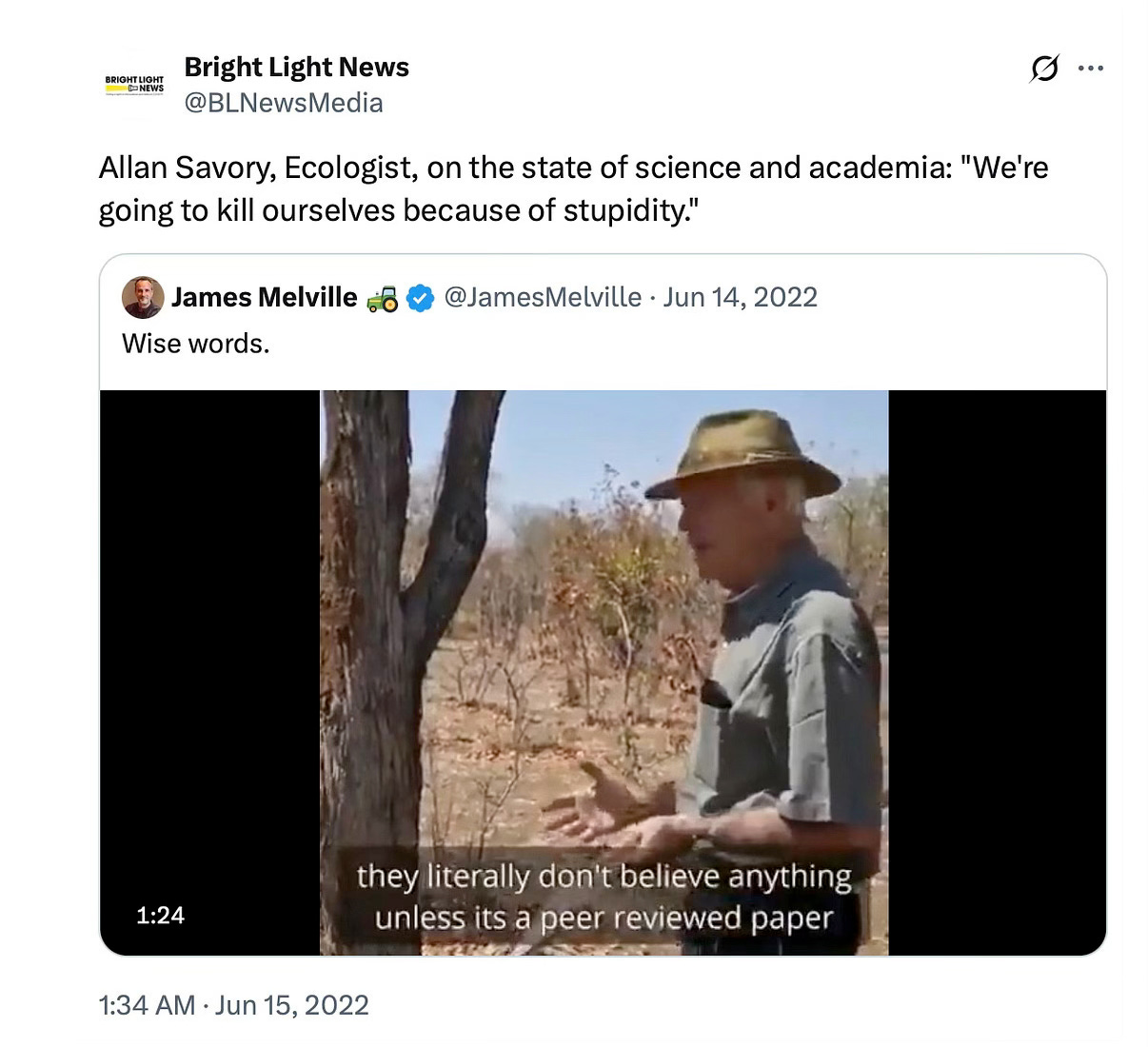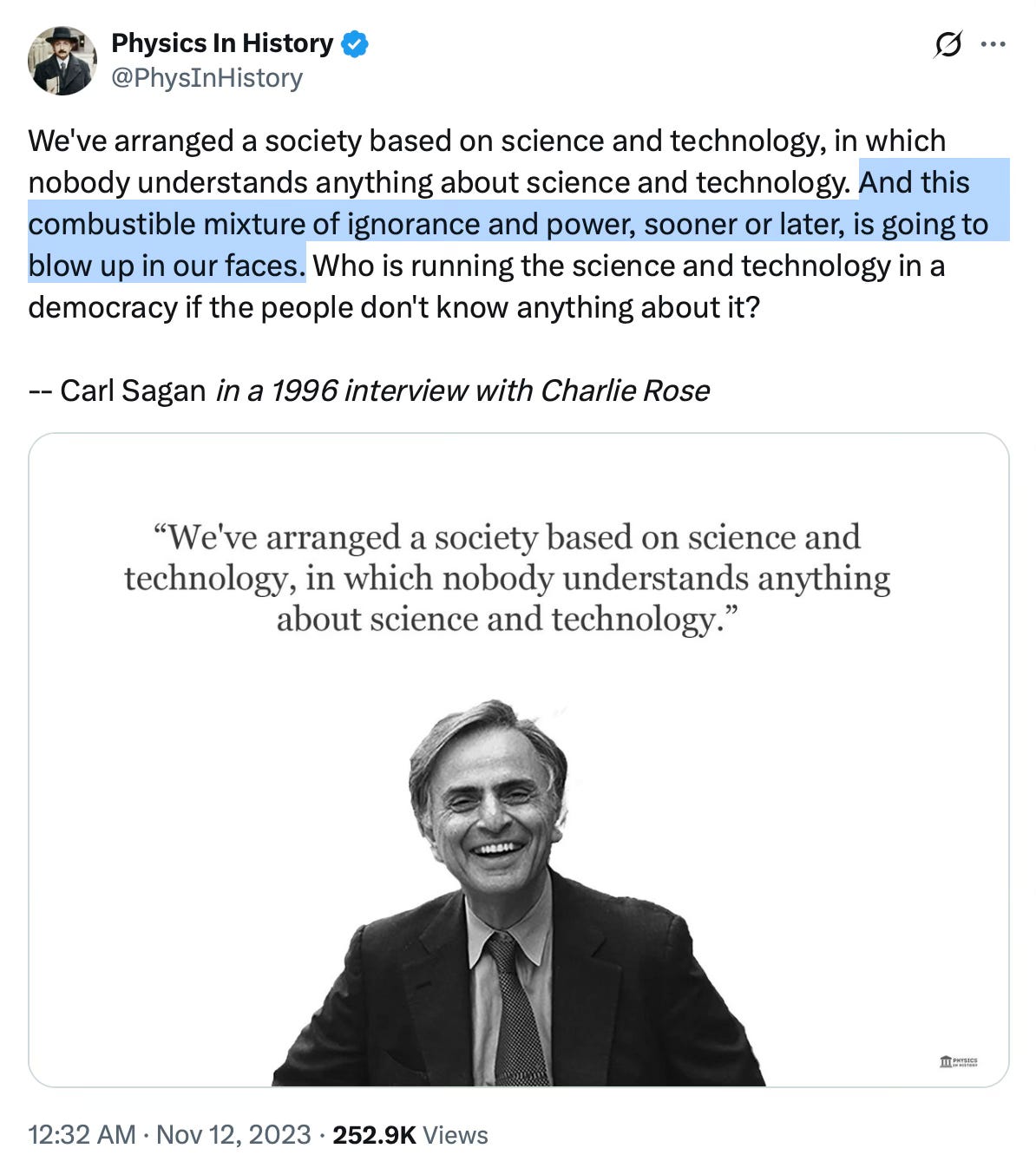Inverting the Real
Science's Metaphysical Crisis
Photo from Unsplash
“When you look at a picture, you may wonder what is imaginary and what is real.Do we talk about the reality of the phenomena or the phenomenon of reality?What is really inside and what is outside?”…
— Rene Magritte
What is your response to the questions that are posed in the above quote by 20th Century Surrealist Artist - Rene Magritte?
Do we talk about the Reality of the Phenomena? (i.e. grounded in the conscious self and ego - the self that intends object (self-as-object) - consciousness is the ground of meaning — a reality as how the world appears to the self - structure of appearance - constitutive phenomenology).
Or do we talk about the Phenomena of Reality? (i.e. grounded in conscious self’s being entangled relationship to being - dissolving the subject-object dichotomy - the event of being’s self-showing through dasein (Heidegger) - consciousness and being are entangled in mutual revelation - It is not the ego that structures meaning, but being itself that grants the openness within which the self appears - being is the ground — a reality through which self and world mutually emerge - event of manifestation of thoughts, beliefs, actions and habits - revelatory phenomenology).
Does Man socially construct Reality? (e.g. Marxism, Sophism)
Or does Man participate in Reality? (e.g. Christian Theology, Plato, Aquinas, Peirce etc. - Contingent Being of Man (Created) and the Necessary Being of God (Creator))
[LINK] - Materialism, Idealism, Cartesian Dualism and the Crisis in Classical Physics
As explored in The Cartesian Crisis [LINK] and Materialism, Idealism, Cartesian Dualism and the Crisis in Classical Physics [LINK], the arrival of Modernity and Post-Modernity represented a Hard-Fork [LINK] in how the Intellectual Orthodoxy across Western Civilisation understood the nature of Reality.
The Triadic Intellectual Scaffolding of Western Civilisation [LINK] was now in the final stages of being deconstructed [LINK] and replaced by:
Primacy of Human Consciousness (e.g. Nominalism [LINK], Cartesianism (res Cogitans) [LINK], Idealism [LINK], Modern Gnosticism [LINK], Nietzschean Perspectivism [LINK]); and a
Primacy of Man (e.g. Theology of Marxism [LINK] (i.e. a Power-Directed System of Thought [LINK]), Historical Materialism [LINK], Post-Modern Liberalism [LINK], Nietzschean Will to Power [LINK], Liberation Theology [LINK] incl. Trans Humanism [LINK] and Übermensch [LINK]).
Was this shift reflective of inverting our understanding of Reality (i.e. a reversed order (refer Alfred Korzybski))?
“Both ignorance and the old metaphysics tend to produce these undesirable nervous effects of reversed orderand so non-survival evaluation.If we use the nervous system in a way which is against its survival structure, we must expect non-survival.Human history is short, but already we have astonishing records of extinction”…
— Alfred Korzybski
Rather than Man participating in Reality (e.g. Plato, Aquinas, Duns Scotus, Peirce - Being as Good [LINK] - Peirce’s Triadic Semiotic and Pragmatic Maxim [LINK]) through our phenomological modes of Being [LINK] (e.g. Peirce’s Phenomenological Categories, Heidegger’s this Being (Dasein) with Being (Sein), Husserl’s Intentional Consciousness) - a Phenomena of Reality - had the prevailing and increasingly secular progressive intellectual orthodoxy [LINK] [LINK] inverted our understanding?
****Note - To apprehend Thirdness as Thirdness means to grasp the reality of the whole, the mediating structures that connect signs, minds, and the world. It is the capacity to recognise that meaning, being and knowing are inherently connected. [LINK] Habits, laws, actions and ideas are real and interdependent. Peirce viewed a nominalist as someone whose philosophical mind was insufficiently developed to recognise the actuality of generality of abstraction. Thirdness can be interpreted as the mediation of both an epistemological and ontological mode of Being ( i.e. one of three modes of Being - Firstness, Secondness and Thirdness - Peirce’s Phenomenological Categories that form a Triadic alongside Aristotle’s Ontological Categories and Kant’s Epistemological Categories).
“In short, there was a tidal wave of nominalism.Descartes was a nominalist. Locke and all his following, Berkley, Hartley, Hume, and even Reid, were nominalists. Leibniz was an extreme nominalist, and Remusat who has lately made an attempt to repair the edifice of Liebnizian monadology, does so by cutting away every part which leans at all towards realism. Kant was a nominalist; although his philosophy would have rendered compacter, more consistent, and stronger if its author had taken up realism, as he certainly would have done if he read Scotus. Hegel was a nominalist of realistic yearnings; I might continue the list much further,Thus, in one word, all modern philosophy of every sect has been nominalistic”…
— Charles Sanders Peirce
Inverting the source of revelation - a Phenomena of Reality ( i.e. Man’s conscious participation in Reality that reflects a Property Dualism [LINK] and relationship between the Conscious Self and Being [LINK]) with a Reality of the Phenomena (i.e. Man’s conscious construction of Reality that reflects a Primacy of Human Consciousness and a Primacy of Man).
For example, Nominalism.
“To be a nominalist consists in the undeveloped state of one’s mind of the apprehension of Thirdness as Thirdness****. The remedy for it consists in allowing ideas of human life to play a greater part in one’s philosophy”…
– Charles Sanders Peirce
Embracing instead the notion that Man shapes and socially constructs Reality (e.g. Marx [LINK], Scientism/Scientific Gnosticism [LINK], Rousseau (Social Contract, General Will & State ) [LINK], Modern Sophism [LINK], New Jacobins [LINK], Hobbes [LINK], Three Waves of Modernity (Strauss Critique of Modernity - Individual Liberalism, Socialism/Communism, Fascism [LINK]), Reformation [LINK] ).
The Illusion of Liberation [LINK] - Signs without Substance [LINK] - Maps that become Territories [LINK] - Geometries of Unknowing [LINK] - New Totalitarianism [LINK] etc.
Inverting the Real - The Crisis in Metaphysics, Science and Knowledge
“In his physics, Aristotle had come to represent the world as an ensemble of forms constituting an eternal harmony, which he paused to contemplate in order to enjoy it as a spectator.Descartes conceived it as a machine that produces its effects over time and that he intends to know in order not to contemplate it but, rather, to learn how to make it work and how to use it.
The first is an artist’s physics, which abstracts from the needs that are imposed on us by our life on earth, and interprets the world as a beautiful thing to see, so that we may act just like pure intellects and dedicate ourselves to the divine pleasure of contemplation.The second is an engineer’s physics, which, rather than regarding the world as a beautiful thing and becoming aesthetically absorbed in its beauty, regards it as a good thing to possess and strives to possess it for the purpose of satisfying the needs of earthly life.
On one side, a science of the contemplation of the world,on the other side a science of its exploitation.
Starting from here, we understand their two theories of knowledge.
For Aristotle it is a matter of identifying oneself with the world in knowledge; conversely,for Descartes it is a matter of distinguishing oneself from the world in order to affirm oneself apart from it and above it (the thought process that leads to the 𝘤𝘰𝘨𝘪𝘵𝘰) for the purpose of knowing the world from above and using it for one’s own ends” …
— Augusto del Noce
The consequences of the inversion of the Phenomena of Reality with the Reality of the Phenomena and the endemic embracement of Marxism [LINK] are profound:
Knowledge
Knowledge is no longer about attempting to understand the relationship between Conscious Self and Being in an attempt to bring a Sense of Coherence [LINK] (i.e. identifying oneself with the World via Knowledge), instead, knowledge becomes an instrument of power in an attempt to liberate Man from God, Nature and Himself [LINK]. In other words, knowing the World from above and using it for one’s own ends [LINK] (refer Del Noce quote above), including Modern Gnosticism [LINK], Trans Humanism [LINK] and a Promethean Impulse [LINK];
Science
Science transforms into Scientism and Scientific Gnosticism [LINK]. Rather than Science being viewed as a process of open inquiry and discovery [LINK] anchored in our Being in the World [LINK], epistemological humility and fallibilism [LINK], Scientism becomes a known codified end-state shaped (e.g. scientific literature & research publications, University ideological alignment), controlled (e.g. intellectual IP) and understood by a technocratic elite [LINK] and scientific clerisy [LINK]. Scientific Positivism and Karl Popper’s Falsification Fallacy [LINK) is positively specious [LINK] and is literally the inversion (i.e. Reality of Phenomena replaces the Phenomena of Reality - Popper’s Falsification idea begins with Human Thought (Study of Logic) and then testing that Thought via Human Conscious Observations [LINK]) of the process of understanding the nature of Knowledge; and
Metaphysics
Dismantling the Metaphysical Intellectual Scaffolding of Western Civilisation [LINK] not only leads to an increasing decoupling from Reality (e.g. a New Dark Age [LINK] [LINK] )- a Theatre of the Absurd [LINK] [LINK], an erosion in our Sense of Coherence [LINK] and Cognitive Liberty [LINK], but ultimately towards the embracement of a Philosophy of Mechanisation [LINK] and a Marxist [LINK] Socially Constructed Reality [LINK] being imposed via force [LINK] [LINK] - Refer Three Waves of Modernity [LINK], New Totalitarianism [LINK] and New Jacobins [LINK].
“in 1952, F.A. Hayek wrote what became The Counter-Revolution of Science.The idea is that in the late 18th and early 19th centuries, a new conception of science was born, which reversed a previous understanding. Science was not a process of discovery by research but a codified end state known and understood only by an elite. This elite would impose its view on everyone else. Hayek called this “the abuse of reason”because genuine reason defers to uncertainty and discovery whilescientism as an ideology is arrogant and imagines it knows what is unknown” …
– The Intellectual Roots of Techno- Primitivism, Jeffrey A Tucker
[ LINK ]
[LINK] - The Calamity of Scientific Gnosticism
[LINK] - The Falsification Fallacy - Popper’s positivism is positively specious
[LINK] - What is Science? - Was there a real ever-present risk of retreating into a World of more and more abstraction (Plato’s Cave)?
What if the Primacy of Existence [LINK] - the act of Being [LINK] was the foundation of Knowledge [LINK]?
In contrast to a Marxist Theology [LINK] anchored in the Primacy of Conscious Man [LINK] [LINK] - Reality as a Social Construct [LINK].
Refer - Charlie Rose Interview - Carl Sagan [LINK]










